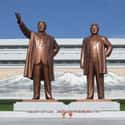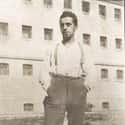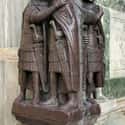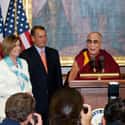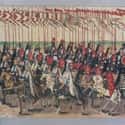-
(#1) North Korea
- Country
After a visit to North Korea, the British academic Christopher Hitchens remarked: "North Korea is unique in having a dead man as head of state: Kim Jong-il is the head of the party and the army but the presidency is held in perpetuity by his deceased father, which makes the country a necrocracy or mausolocracy..."
The origins of the current North Korean state are incredibly complicated, but it is true that Kim Il-sung, the first leader of modern North Korea, is the "Eternal President" of the country. Kim Jong-un is the head of the party and the military, but technically not the state. The reason for this is that North Korea is one of the most intensely leader-worship-driven societies in the modern world. Kim Il-sung is literally revered as a god, with shrines in all major buildings, murals depicting his accomplishments, songs praising him, and regularly scheduled mandatory worship.
While this religious totalitarianism is unusual in the modern world, it is not without precedent. The deification of rulers is a tradition dating back to the Ancient Egyptian pharaohs.
-
(#2) High Wycombe
- Place
The town of High Wycombe, England, has a very old-fashioned way of checking for corruption. Traditionally, the mayor is weighed by a town official called the "Macebearer." The macebearer will call out the weight of the mayor, and if this call is followed by "and no more," it means the mayor has not been getting fat on the taxpayers' money. However, if the macebearer calls out "and some more," the crowd boos, and the mayor is accused of embezzlement.
While the tradition dates back to the Middle Ages, these days it's an entirely ceremonial moment. In the old days, the citizens would pelt corpulent mayors with rotten fruit. However, that part of the tradition hasn't survived.
-
(#3) The Taiping Heavenly Kingdom Government Was Led By A Man Who Claimed To Be Christ's Brother
Hong Xiuquan was a provincial schoolteacher in 19th century China who probably wouldn't appear in the history books if a Christian missionary hadn't handed him a copy of the New Testament one day. After reading the book, he decided that dreams he'd had earlier in life featuring a man with a long white beard meant he was the brother of Christ, and his job was to create a Christian government in China.
Hong hit the road and preached a message of Christianity, but also a message of equality for the poor. In fact, Hong's political views are described by experts as "a primitive kind of communism." By promising land to everyone in his army, he recruited vast numbers of peasants very quickly and overwhelmed the unsuspecting Chinese troops.
As might be expected from a man who had never had a civics lesson, Hong set up a short-lived government based on a combination of Christian teachings and his own whims. He imposed restrictions on his followers, forbidding adultery and licentiousness, and brutal punishments if they were violated, including beheadings. However, as he grew more paranoid, Hong retreated to the company of his 60 concubines. He was eventually poisoned, although it's unclear if he was killed or if the death was self-inflicted.
-
(#4) Bosnia and Herzegovina
- Country
A full understanding of the Bosnia-Herzegovina government system is beyond the scope of this article. It is perhaps the most complicated governmental system in the world today, and it is mired in the intricate and byzantine strife that came along with the Balkan Wars.
The current system began with the Dayton Peace Agreement in 1995. It stipulates that the nation has three presidents: one Bosnian, one Croat, and one Serb. This ethnic division extends to the 15-member House of Peoples, which consists of five Bosnians, five Croats, and five Serbs. This isn't even touching on the Republika Srpska, an almost-autonomous entity state within the country. It is even further compounded by the many nationalist movements and political parties across the small country.
This system is the result of the intense ethnic conflicts that led to war in the Balkans in the '90s. While the violence has calmed down, the tensions still seethe, hence the divided governments.
-
(#5) Andorra
- Country
There is an argument to be made that the larger a country is, the more effective its system must be, and that smaller populations can get away with systems that would never fly in nations like Russia or China. If this is true, then the tiny nation of Andorra could use just about any system it likes. Andorra is a co-principality, and has two heads of state, plus a prime minister. However, these two heads of state are not royalty, and they are not democratically elected. At least, not in Andorra.
In the 13th century, Spain and France were at odds over the tiny principality, nestled as it is between the two of them in the Pyrenees. The solution to the constant tug-of-war was devised in 1278, when a Spanish bishop and a French count were named co-princes of the tiny nation. Over the years, this princehood was instead given to the French king, and eventually the French president. Yes, this means Emmanuel Macron is a prince.
However, the day-to-day running of Andorra does not much involve Macron, nor his Spanish counterpart Joan Enric Vives i Sicília, the current Bishop of Urgell. Instead, it is managed by Prime Minister Xavier Espot Zamora, head of the Democrats for Andorra party.
-
(#6) The Bavarian Republic Was Run By Writers And Artists For Six Days
As World War I reached its disastrous conclusion for Germany, many revolutions and secessions took place within the country, including the revolution of a province called Bavaria. After a couple of abortive attempts, the various left-wing parties established a Soviet republic on April 6, 1919. At its head was Ernst Toller, an idealistic 26-year-old and future playwright. He was supported by many other artists and writers.
One of his advisors said they only needed a few days to reshape the world. Six days was all they would get. The various ministers under Toller's government ranged from incompetent to downright bizarre. His Commissar of Foreign Affairs sent a telegram to the pope complaining about a stolen bathroom key, which finally prompted Toller to remove him from office. The government accomplished nothing of substance in its time in power, and, on April 13, was deposed by a military coup.
The group of pacifist and anarchist thinkers who had run the government faced brutal consequences, including, in some cases, execution. Toller himself received a fairly light sentence of five years in prison, during which time he wrote some of his best plays, which are still in print today.
-
(#7) Belgium
- Country
Like many nations, Belgium holds elections and then forms coalition governments. This ensures that the majority can't totally overwhelm the losing party, and incentivizes cooperation between political parties. When it doesn't work, however, it can lead to stalemates and even deeper partisan conflicts.
Belgium - which is bordered by France, Germany, the Netherlands, and Luxembourg - is a hotbed of different ethnic groups. In 2010, the two dominant political parties, the Flemish and the Walloons, turned the election into a referendum on numerous old grudges (including Flemish collaboration with the Germans during World War II) and were unable to reach a consensus and establish a government. This continued for 589 days, the longest such delay on record.
While there was no officially elected government, a temporary "caretaker" government was run by the former Prime Minister. This government avoided any major decisions for its entire tenure. While some worried this would cripple the country economically, it seemed to have little effect overall.
-
(#8) The Roman Tetrarchy Had Four Rulers
At the end of the 3rd century CE, the Roman Empire was vast and in great upheaval. The Emperor Diocletian had elevated Maximian to co-Emperor (although Diocletian was still the chief). However, with a usurping Roman general claiming emperorship of Britain, Diocletian still had more on his plate than he could handle.
This was when Diocletian introduced the Tetrarchy, a strange and unprecedented governmental system. According to this system, Diocletian and Maximian would reign as the emperors, and two other Romans would reign as tetrarchs. The tetrarchs functioned as both vice-emperors and successors. This also made the emperors less vulnerable to capture or political assassination. The government remained stable through the government of Diocletian and Maximian and passed smoothly to their successors, Galerius and Constantius.
However, after the death of Constantius there came a period known as the Civil Wars of the Tetrarchy. This period ended when Emperor Constantine came to power in 324 and abolished the Tetrarchy.
-
(#9) Lebanon
- Country
In 1943, Lebanon threw off its French colonizers and was faced with the challenge of devising a government in a land deeply divided by religious and ethnic tensions. The solution was a form of government known as "confessionalism." It has nothing to do with confessing sins, but instead refers to a system by which different ethnic and religious groups had representation in the government in proportion to their population size.
This solution was never meant to be permanent, but it remained in place even after the ousting of Syrian influence and troops in 2005. It is, without doubt, a flawed system, and the Lebanese are deeply divided on it. Some argue that it increases and encourages sectarianism, while others see it as the only way to prevent all-out war.
-
(#10) The Dalai Lama Operates A Government-In-Exile
On August 21, 1959, the Dalai Lama crossed the border into India. He was forced out by Chinese suppression of a Tibetan uprising, and relocated to Dharamsala in India, with the support of the Indian government. From this position, he has been the leader of an exilarchy, a government-in-exile, that refuses to recognize Chinese control of Tibet.
While the Dalai Lama is a well-known public figure, raising support for his cause in the public arena, the actual functions of the Central Tibetan Administration have varied over the years. In 2011, the Dalai Lama gave up his political position and a democratic election was held, resulting in Dr. Lobsang Sangay becoming president of the CTA. The CTA splits its time between advocating for a free (or at least culturally autonomous) Tibet, fundraising, and supporting Tibetans in exile. One of its chief activities is administering schools for Tibetan exiles, of which there is a growing number each year.
There have been many exiled governments throughout human history, though Tibet is probably the most visible in the modern era. The Vatican has had so many splits and schisms, it even has a special name for someone claiming to be the legitimate pope but who does not rule from Rome: an Antipope.
-
(#11) Bangladesh
- Country
In the mid-'90s, Bangladeshi elections were replete with fraud and partisan violence. So a system was developed to help smooth out the transition between governments: a nonpartisan "caretaker" government that would make no policy decisions, but would take over during the transition from one government to the next. This caretaker government was not an elected body.
Instituted in 1996, the caretaker system lasted almost 10 years without any major problem. However, in 2006, a military-backed caretaker government led by the economist Fakhruddin Ahmed declared a state of emergency and delayed elections for two years in order to, they said, clean up dirty politicians. This led to an enormous backlash and was seen as the prelude to a military coup. The caretaker government system was abolished in 2011 after a contentious vote.
-
(#12) Two Kings Shared Power In Ancient Sparta
The Spartan state was designed, top to bottom, for war. However, its leadership was particularly rare, because it is what's called a symmetrical diarchy, meaning that it has two kings of equal power. Most diarchies subordinate one king to the other.
There is a lot of scholarly debate about the role of the kings relative to the two other major Spartan political bodies, the ephors (a five-member executive committee) and the gerousia, a 28-person council the king sat on as well. While the kings could sit on the gerousia, the ephors could only serve a maximum of one year and could hold no other political office. This was an effort to avoid the over-concentration of power. However, the kings were hereditary and were also priests of Zeus, which further concentrated power in the monarchy.
This system was set up because Sparta was a warlike state. On campaign, the kings were at the height of their political powers, encountering little in the way of checks and balances from the ephors or the gerousia.
-
(#13) The Polish-Lithuanian Commonwealth Was Beset By Regional Tyranny
These days, Poland tends to be seen as a somewhat powerless state, seemingly kicked around by Germany to the west and Russia to the east. However, in the 16th century, the Polish-Lithuanian Commonwealth was the largest nation in Europe, aside from the Ottoman Empire and the Grand Duchy of Moscow.
Their vast expanse of territory made it difficult for the monarchy to directly control the entire land. So the Commonwealth became increasingly provincial, with local lords wielding more and more power. After Poland and Lithuania were officially joined, the king was elected by the local nobles, turning the country from a monarchy to an unusual kind of oligarchy, a "republic of nobles."
While this might seem like an unstable system, it survived until the end of the 18th century.
New Random Displays Display All By Ranking
About This Tool
From the perspective of the development of world history, the country has transitioned from the rule of the king to the current democratically elected government, and the army has also become a part of the modern government. The governments of different countries in the world are now in power, and there are still some monarchy countries in the Middle East that are still controlled by the monarch, and some governments are in power by the military.
Looking back at history, the random tool lists 13 of the most bizarre governments that you may never know, such as North Korea, Andorra, Bosnia, and Herzegovina, etc. Many different forms of government tried to lead the country in reform and development.
Our data comes from Ranker, If you want to participate in the ranking of items displayed on this page, please click here.









